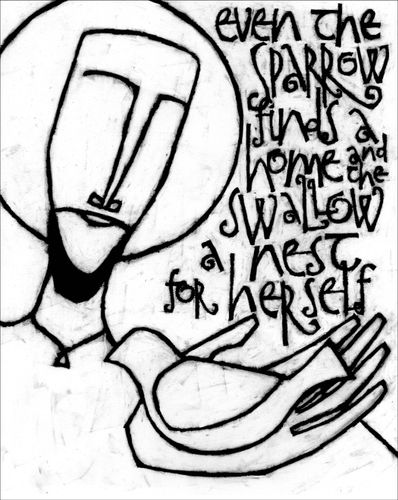
Beloved Members of St. Martin’s,
This Sunday we hear from one of my favorite psalms—Psalm 84, which speaks of the joy of standing within the house of God, and feeling at home there.
Last week, someone remarked to me how joyful it is to see our little children so engaged in church. The reason is simple: because we take seriously the fact that they are fully members of the Church. Not future members. Members now. And they feel at home here. As it should be. They show the same joy and sense of security that the psalmist speaks of when talking about the sparrow and the swallow.
Psalm 84 starts with an outburst of joy as the psalmist stands within the boundaries of the Temple. I love these opening verses from the Common English Bible translation: How lovely is your dwelling place, Lord of heavenly forces! My very being longs, even yearns, for the Lord’s courtyards. My heart and my body will rejoice out loud to the living God! Yes, the sparrow too has found a home there the swallow has found herself a nest where she can lay her young beside your altars, Lord of heavenly forces, my king, my God! Those who live in your house are truly happy; they praise you constantly. (Common English Bible version)
The image of the sparrow and the swallow, two tiny birds who could both fit in the palm of one hand, so fragile and vulnerable, nonetheless knowing that they were safe by the altars of God—that really speaks to me. Two tiny birds, one of whom is also the target of hatred and contempt even by those who consider themselves “birders.” A sparrow has nothing going for it, really: it’s got dull brown plumage, it’s got a reputation as a usurper since they were introduced by some misguided soul to American in the 19 century. They’re common. They’re not flashy or known for amazing song. Swallows, likewise, are tiny, and many are endangered due to the use of pesticide everywhere, since they live by eating insects.
According to Psalm 84, the sparrow and the swallow are at home in God’s Temple; they feel so safe, despite their fragility, they have made their homes, their nests, right up alongside the altars of God. This image becomes even more vivid when we consider that in other biblical testimony, birds were more likely to be sacrificed near that altar than find their home there. The holy precinct are truly places of sanctuary and refuge, we are reminded here. The original Hebrew words used are even more vivid and direct. The word for “lovely”—yedidot-- is never used to describe an inanimate object like an altar except in this psalm: the other place where yedidot shows up repeatedly is in the Song of Songs, that beautiful ancient love poem that is so frank in describing the delights of one’s beloved, especially physically, that apparently the makers of the Revised Common Lectionary could only countenance one tiny part of it to be included without making all of us blush. It’s used to describe someone so lovely as to inspire not just longing but sense of wonder as honey-sweet as looking at a magnificent artwork or hearing a transcendent musical masterpiece.
That feeling of safety and security, of being at home near the altars of the Holy One, is something I see shining from the faces of our little ones every Sunday as they gather near the lectern and edge as close as they dare to the area around the altar known as the chancel. They lean in, drawn irresistibly and with joy and a whole-hearted embrace of worship. As they lean through the altar rail, I always rejoice at how safe and secure they feel, and how fully they bare their hearts to God, how they know they have found themselves a home here, just as those wee birds in the psalm have done.
What difference might it make in our lives if we looked upon even the tiny and humble beings in our lives not with contempt, but wonder? With gratitude, even, remembering that for as marginalized as they are, not a single sparrow falls to the ground but God sees, and mourns, as Jesus remarks in Matthew 10:29-31 and Luke 12:6-7.
In Christ’s love,
Mother Leslie+